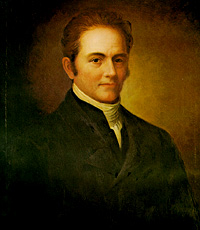Langdon Cheves | |
|---|---|
 Portrait of Cheves as Speaker of the U.S. House c. 1815 | |
| President of the Second Bank of the United States | |
| In office March 6, 1819 – January 6, 1823 | |
| President | James Monroe |
| Preceded by | James Fisher (acting) |
| Succeeded by | Nicholas Biddle |
| 8th Speaker of the United States House of Representatives | |
| In office January 19, 1814 – March 3, 1815 | |
| Preceded by | Henry Clay |
| Succeeded by | Henry Clay |
| Member of the U.S. House of Representatives from South Carolina's 1st district | |
| In office December 31, 1810 – March 3, 1815 | |
| Preceded by | Robert Marion |
| Succeeded by | Henry Middleton |
| Attorney General of South Carolina | |
| In office December 8, 1808 – December 4, 1810 | |
| Governor | John Drayton |
| Preceded by | John Pringle |
| Succeeded by | John Richardson |
| Member of the South Carolina House of Representatives from the Parish of St. Philip and St. Martin | |
| In office November 22, 1802 – 1804 | |
| In office 1806 – December 8, 1808 | |
| Personal details | |
| Born | September 17, 1776 Abbeville County, South Carolina, U.S. |
| Died | June 26, 1857 (aged 80) Columbia, South Carolina, U.S. |
| Political party | Democratic-Republican |
| Spouse | Mary Dulles |
| Children | 14, including Louisa |
Langdon Cheves (/ˈtʃɪvɪs/[1][2] September 17, 1776 – June 26, 1857) was an American politician, lawyer and businessman from South Carolina. He represented the city of Charleston in the United States House of Representatives from 1810 to 1815, where he played a key role on the home front of the War of 1812. Cheves was a leader among the War Hawk faction of the House. He served as chairman of the Committees on Naval Affairs and Ways and Means under Speaker of the House Henry Clay, then succeeded Clay as Speaker in the war's final stages. After leaving the House, he served as President of the Second Bank of the United States from 1819 to 1823.
After leaving public office, Cheves was an active advocate for unified Southern resistance to protective tariffs and any attempt to abolish slavery, though an opponent of unilateral action by South Carolina or any one state. Originally, Cheves advocated for a convention of Southern states to pressure Congress into adopting these positions, but eventually became one of the earliest advocates for outright regional secession from the United States.
- ^ Neuffer, Claude; Neuffer, Irene (1983). Correct Mispronunciations of Some South Carolina Names. University of South Carolina Press.
- ^ Huff 1977, p. 1.